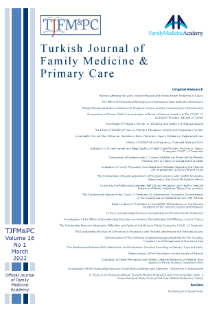Gebelerde Coronavirus ilişkili anksiyete sıklığı ve etkileyen faktörlerin değerlendirilmesi: Kesitsel çalışma
Gebelik, gebe kadın, Coronavirus, anksiyete
Evaluation of the frequency of anxiety related coronavirus and affecting factors in pregnant women: A cross-sectional study
Pregnancy, pregnant woman, Coronovirus, anxiety,
___
- 1. Cohen S, Abukhalaf A. COVID-19's negative mental health impact goes well beyond standard at-risk populations: Action needs to be taken to combat long-term nationwide emotional disruption. Academia Letters. 2021:2. https://doi.org/10.20935/AL3621 https://doi.org/10.20935/AL3621
- 2. Bo H-X, Li W, Yang Y, et al. Posttraumatic stress symptoms and attitude toward crisis mental health services among clinically stable patients with COVID-19 in China. Psychological medicine. 2021;51(6):1052-3. https://doi.org/10.1017/S0033291720000999
- 3. Davies SE, Bennett B. A gendered human rights analysis of Ebola and Zika: locating gender in global health emergencies. International Affairs. 2016;92(5):1041-60. https://doi.org/10.1111/1468-2346.12704
- 4. World Health Organization (WHO). Gender disparities and mental health: The facts. Gender and Women's Mental Health. 2016. https://www.euro.who.int/en/health-topics/health-determinants/gender/activities/gender-and-non-communicable-diseases/gender-and-mental-health Access Date:01/06/2022
- 5. Carter D, Kostaras X. Psychiatric disorders in pregnancy. British Columbia Medical Journal. 2005;47(2):96.
- 6. Lebel C, MacKinnon A, Bagshawe M, Tomfohr-Madsen L, Giesbrecht G. Elevated depression and anxiety symptoms among pregnant individuals during the COVID-19 pandemic. Journal of affective disorders. 2020;277:5-13. https://doi.org/10.1016/j.jad.2020.07.126
- 7. Wang C, Pan R, Wan X, et al. Immediate psychological responses and associated factors during the initial stage of the 2019 coronavirus disease (COVID-19) epidemic among the general population in China. International journal of environmental research and public health. 2020;17(5):1729. https://doi.org/10.3390/ijerph17051729
- 8. Lee SA. Coronavirus anxiety scale: A brief mental health screener for COVID-19 related anxiety. Death studies. 2020;44(7):393-401. https://doi.org/10.1080/07481187.2020.1748481
- 9. Biçer İ, Çakmak C, Demir H, Kurt Me. Koronavirüs anksiyete ölçeği kısa formu: Türkçe geçerlik ve güvenirlik çalışması. Anatolian Clinic the Journal of Medical Sciences. 2020;25(Special Issue on COVID 19):216-25.
- 10. Karaçam Z, Ançel G. Depression, anxiety and influencing factors in pregnancy: a study in a Turkish population. Midwifery. 2009;25(4):344-56. https://doi.org/10.1016/j.midw.2007.03.006
- 11. Caliskan D, Oncu B, Kose K, Ocaktan ME, Ozdemir O. Depression scores and associated factors in pregnant and non-pregnant women: a community-based study in Turkey. Journal of Psychosomatic Obstetrics & Gynecology. 2007;28(4):195-200. https://doi.org/10.1080/01674820701450649
- 12. Alberque C, Bianchi-Demicheli F, Andreoli A, Epiney M, Irion O. Management of severe antepartum depression: an update. Revue medicale suisse. 2008;4(144):392, 4, 6-7.
- 13. Lucchini M, Shuffrey LC, Firestein M, et al. The impact of covid-related stress on maternal sleep during pregnancy. Biological Psychiatry. 2022;91(9):S25-S6. https://doi.org/10.1016/j.biopsych.2022.02.080
- 14. Yildirim H, Işik K, Aylaz R. The effect of anxiety levels of elderly people in quarantine on depression during covid-19 pandemic. Social Work in Public Health. 2021;36(2):194-204. https://doi.org/10.1080/19371918.2020.1868372
- 15. Ding W, Lu J, Zhou Y, Wei W, Zhou Z, Chen M. Knowledge, attitudes, practices, and influencing factors of anxiety among pregnant women in Wuhan during the outbreak of COVID-19: a cross-sectional study. BMC pregnancy and childbirth. 2021;21(1):1-9. https://doi.org/10.1186/s12884-021-03561-7
- 16. Dennis C-L, Falah-Hassani K, Shiri R. Prevalence of antenatal and postnatal anxiety: systematic review and meta-analysis. The British Journal of Psychiatry. 2017;210(5):315-23. https://doi.org/10.1192/bjp.bp.116.187179
- 17. Fullana MA, Hidalgo-Mazzei D, Vieta E, Radua J. Coping behaviors associated with decreased anxiety and depressive symptoms during the COVID-19 pandemic and lockdown. Journal of Affective Disorders. 2020;275:80-1. https://doi.org/10.1016/j.jad.2020.06.027
- 18. Guo Y, Cheng C, Zeng Y, et al. Mental health disorders and associated risk factors in quarantined adults during the COVID-19 outbreak in China: cross-sectional study. Journal of medical Internet research. 2020;22(8):e20328. https://doi.org/10.2196/20328
- 19. Hyland P, Shevlin M, McBride O, et al. Anxiety and depression in the Republic of Ireland during the COVID‐19 pandemic. Acta Psychiatrica Scandinavica. 2020;142(3):249-56. https://doi.org/10.1111/acps.13219
- 20. Rodríguez-Rey R, Garrido-Hernansaiz H, Collado S. Psychological impact and associated factors during the initial stage of the coronavirus (COVID-19) pandemic among the general population in Spain. Frontiers in psychology. 2020 Jun;11:1540. https://doi.org/10.3389/fpsyg.2020.01540
- 21. Ng J, Sham A, Tang PL, Fung S. SARS: pregnant women's fears and perceptions. British Journal of Midwifery. 2004;12(11):698-702. https://doi.org/10.12968/bjom.2004.12.11.16710
- 22. Shevlin M, McBride O, Murphy J, et al. Anxiety, depression, traumatic stress and COVID-19-related anxiety in the UK general population during the COVID-19 pandemic. BJPsych open. 2020;6(6). https://doi.org/10.1192/bjo.2020.109
- 23. Bozkurt N. Bir grup üniversite öğrencisinin depresyon ve kaygı düzeyleri ile çeşitli değişkenler arasındaki ilişkiler. Eğitim ve Bilim. 2004;29(133):52-59
- 24. Özdin S, Bayrak Özdin Ş. Levels and predictors of anxiety, depression and health anxiety during COVID-19 pandemic in Turkish society: The importance of gender. International Journal of Social Psychiatry. 2020;66(5):504-11. https://doi.org/10.1177/0020764020927051
- 25. Zhou F, Yu T, Du R, et al. Clinical course and risk factors for mortality of adult inpatients with COVID-19 in Wuhan, China: a retrospective cohort study. The Lancet. 2020;395(10229):1054-62. https://doi.org/10.1016/S0140-6736(20)30566-3
- 26. Cansel N, Ucuz İ, Arslan AK, et al. Prevalence and predictors of psychological response during immediate COVID‐19 pandemic. International Journal of Clinical Practice. 2021;75(5):e13996. https://doi.org/10.1111/ijcp.13996
- 27. Bitan DT, Grossman-Giron A, Bloch Y, Mayer Y, Shiffman N, Mendlovic S. Fear of COVID-19 scale: Psychometric characteristics, reliability and validity in the Israeli population. Psychiatry research. 2020;289:113100. https://doi.org/10.1016/j.psychres.2020.113100
- ISSN: 1307-2048
- Yayın Aralığı: Yılda 4 Sayı
- Başlangıç: 2007
- Yayıncı: -
Feride Rabia TETİK, Cemile KÜTMEÇ YILMAZ
Remzi SÜNTAR, Melike MERCAN BAŞPINAR, Süleyman SALMAN, Okcan BASAT
HİPERTANSİF HASTALARDA EĞİTİMİN İLAÇ VE TEDAVİYE OLAN UYUMA ETKİSİNİN ARAŞTIRILMASI
Ahmet Emre HATIR, Nazan KARAOĞLU, Yakup ALSANCAK
Mehtap ALTUNTAŞ, Mustafa Kürşat ŞAHİN
Hasta Merkezli İletişim Ölçüm Aracının Değerlendirici İçi ve Değerlendiriciler Arası Güvenilirliği
Tolga GÜNVAR, Yunus GÜREL, Dilek GÜLDAL, Okay BAŞAK
Covid-19 Pandemisi Sürecinde Okul Çocuğuna Sahip Ebeveynlerin Anksiyete Düzeylerinin Belirlenmesi
Şeyma SOYANIT, Huriye Demet CABAR, Gözde AVCI, İlknur AYDIN AVCI
Samsun’da Eğitim ve Araştırma Hastanesi’ne Başvuran Göçmenlerin Sağlık Kayıtlarının İncelenmesi
Esra SARAÇOĞLU, Erdinç YAVUZ, İlknur AYDIN AVCI
Kadınların Algıladıkları Sosyal Desteğin Annelik Fonksiyonu ile İlişkisinin İncelenmesi
Eda GÜLBETEKİN, Öznur ÖZDEMİR GÖKMEN
Sema Gizem ÇALIŞKAN, Nazlı HACIAĞAOĞLU, Sabah TUZUN, Can ÖNER, Engin Ersin ŞİMŞEK, Huseyin CETİN
